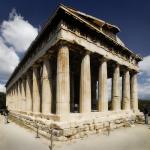|
This section contains 1,134 words (approx. 4 pages at 300 words per page) |

|
Greek Influences.
The period between the death of Alexander the Great of Macedon (323 B.C.E.) and the beginnings of the Roman Empire (31 B.C.E.) is known to scholars as the Hellenistic era. Even though Athens had undergone a major political downfall, its cultural production remained steady, and its influence on first the Etruscans, from the region of Etruria in northern Italy, and later the Romans is incalculable. The Greeks continued to be highly invested in theater and its performance. Around 300 B.C.E., an actor's union, called the Artists of Dionysus, was established throughout Greece and other Hellenistic sovereignties, a sign of the continuing attraction of the presentation of Greek tragic and comic drama. This powerful guild functioned as a religious organization that was politically independent, with its own priests and sanctuaries (of the god Dionysus) as well...
|
This section contains 1,134 words (approx. 4 pages at 300 words per page) |

|




